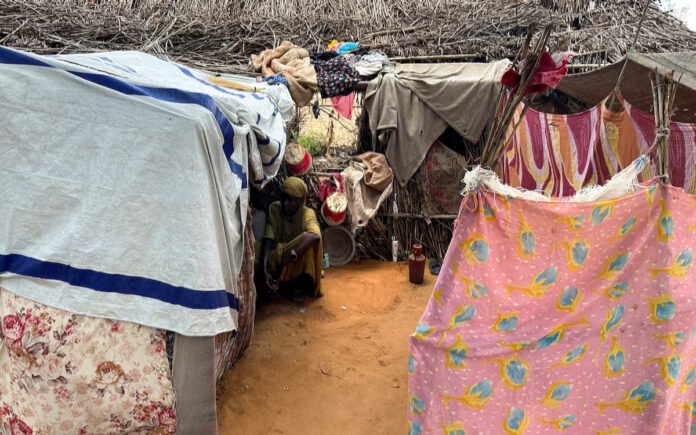Khartoum: Sudan’s Rapid Support Forces (RSF) have launched an assault on the famine-stricken Zamzam displacement camp, according to residents and medical sources. The paramilitary group is attempting to consolidate control over its Darfur stronghold while facing territorial losses to the army in the capital, Khartoum.
The latest clashes have reinforced the battle lines between the RSF and Sudanese Armed Forces (SAF), deepening a conflict that has plunged half the population into hunger and displaced over one-fifth of the country’s people since the war erupted in April 2023.
Crisis in Zamzam Camp
Throughout the week, the RSF has carried out multiple attacks on Zamzam residents, according to three sources inside the camp. Medical aid organization Médecins Sans Frontières (MSF) confirmed at least seven deaths, but local residents fear the toll may be significantly higher. Medical facilities within Zamzam are unable to conduct surgeries, and evacuations to al-Fashir’s Saudi hospital—a frequent RSF target—are no longer feasible, MSF reported.
A video verified by Reuters showed RSF fighters inside Zamzam earlier in the week, stamping on a rival flag as a building burned in the background. The camp, located near al-Fashir, the capital of North Darfur, is the last major army stronghold in the Darfur region.
The RSF has not issued an official response but has previously claimed that Zamzam serves as a base for the Joint Forces—former rebel groups now allied with the army. However, the Joint Forces refuted this in a statement on Thursday, stating they had no presence inside the camp. Sudan’s government announced that the army, along with the Joint Forces and volunteer fighters, managed to push RSF forces back from Zamzam on Wednesday.
Sudan's Rapid Support Forces attacked the famine-stricken Zamzam displacement camp, residents and medics say, as the paramilitary tries to tighten its grip on its Darfur stronghold while losing ground to the army in the capital, Khartoum https://t.co/CEXJkcUvk9 pic.twitter.com/XyJIprjS6Q
— Reuters (@Reuters) February 14, 2025
Arson and Ongoing Attacks
Nearly 22 months into the war, the RSF has established control over most of Darfur and parts of Kordofan, while the army maintains control over northern and eastern Sudan and has recently reclaimed key areas in Khartoum.
Ibrahim al-Mirghani, a politician aligned with the RSF, told Reuters that a “political charter” establishing a parallel government in RSF-held areas is expected to be signed next week, with a cabinet announcement to follow shortly.
For months, Zamzam has been subjected to RSF artillery shelling, forcing many residents to dig holes for shelter, according to one resident and activist-shared videos.
“Inside the neighborhoods, they terrorize, steal, and kill … people hide in these holes when they are firing and when they are raiding, because there is nowhere else to flee,” a resident told Reuters.
Recent reports from the Yale School of Public Health’s Humanitarian Research Lab indicate that RSF raids and arson attacks have continued in villages surrounding al-Fashir. According to the lab’s executive director, Nathaniel Raymond, satellite imagery confirmed that over half of Zamzam’s main market structures were destroyed in fires, consistent with deliberate arson.
A video shared by Darfur governor Minni Minnawi, who is aligned with the army, depicted burned-out market stalls and food items strewn across the ground. Additional fires were identified at residences near the camp’s northern entrance, Raymond confirmed.
With tens of thousands displaced by the violence, Zamzam’s population has swelled to nearly one million, according to the International Organization for Migration.
Also Read | M23 Fighters Claim Control of Bukavu, Expanding Territory
Escape Routes Blocked, Humanitarian Aid Disrupted
Sudan’s top U.N. official, Clementine Nkweta-Salami, condemned the attacks, stating on Thursday that she was “shocked by the attacks on Zamzam IDP camp and the blockages of escape routes.”
Across Darfur, RSF forces have also imposed restrictions on humanitarian aid, which has been further disrupted by U.S. funding freezes on relief programs, according to U.N. and aid workers.
MSF, one of the few humanitarian organizations still operating in the region, reported that the escalating violence forced it to suspend a critical nutrition program for 6,000 malnourished children. Rising food prices due to the attacks have worsened the crisis, said MSF’s North Darfur coordinator, Marion Ramstein.
In August, a global hunger monitor declared that Zamzam was experiencing famine. By December, famine had been confirmed in two additional camps in al-Fashir. Earlier this month, MSF reported that 34% of children in Zamzam were suffering from malnutrition, mirroring conditions in Tawila, a nearby town where many displaced people have fled to escape RSF attacks.



